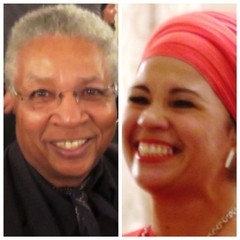|
Back
Tyrants, Liberators, Pain and Solace New York
Americas Society 680 Park Avenue
10/01/2017 -
Momenta Festival II: “Tyrants and Liberators”:
Alvin Singleton: Somehow We Can
Agustin Fernández: String Quartet No. 2, Sin Tiempo
Stephanie Griffin/Hilliard Greene: Improvised duo based on “Sometimes I Feel Like a Motherless Child”
Arnold Schoenberg: Ode to Napoleon, Op. 41
Telmary Diaz (Reciter)
Christopher Oldfather (Pianist), Hilliard Greene (Bassist), Momenta Quartet: Emilie-Anne Gendron, Alex Shiozaki (Violins), Stephanie Griffin (Viola), Michael Haas (Cello), Sebastian Zubieta (Conductor)

A. Singleton/T. Diaz (© Samuel A. Dog)
“There's music in the sighing of a reed;/There's music in the gushing of a rill;
There's music in all things, if men had ears;
The earth is but the music of the spheres.”
Lord George Gordon Byron (1788-1824)
A single truth before anything else: both Lord Byron and Arnold Schoenberg had it wrong!!
Byron wrote his ironic Ode to Napoleon in English. Obviously, Spanish is the one and only language for this searing poem. And Schoenberg wrote his 12-tone version of Ode to Napoleon for a serious Sprechtstimme baritone reciter. As we learned last night, the “onlie true begetter” (in Shakespeare’s phrase) is a Cuban jazz/rap artist who both sprechs and stimmes in a version which soars to the heavens. In fact, Telmary Diaz personifies, and augments, all the violence and accusation and madness in–what Schoenberg himself describes–as “the seventy kinds of derision, sarcasm, hatred, ridicule, contempt, condemnation which I tried to portray in my music.”
Telmary Diaz was the most unlikely suggestion by conductor Sebastian Zubieta for the reciter. The result was fire and ice, the paradigm interpreter from the notes on the score, but with a volcanic geyser of emotions. And while the chamber group–the Momenta Quartet, pianist Christopher Oldfather and conducting by Mr. Zubieta–was electrifying, it was the luminosity of Ms. Diaz which surpassed the Austrian’s most ardent hopes.
As for the language, Byron is the most truly Romantic of the poets, but think of the difference between the spineless English (“Where may the wearied eye repose/When gazing on the Great?”) and the incandescent Spanish when erupting with Temara Diaz’s blistering contralto: “¿Dónde puede el ojo reposar/Cuando mira al Grande?”
This, the final work in the second of the four-part Momenta Festival, was more than music. In an evening entitled “Tyrants and Liberators”, the Momenta Quartet presented three other pieces which were original, daring and honestly moving. Not a single “spineless” choice in the lot.
In the elegant auditorium of the Americas Society, the evening started with Alvin Singleton’s searing Somehow We Can, written a quarter-century ago in honor of Marian Anderson.
Mr. Singleton, aware of the voice and the courage of Ms. Anderson in standing up to bigoted societies like the Daughters of the American Revolution, could have written something bathetic, an homage to a great woman. Somehow We Can was more audacious, and in a single movement, vatried both violence and solace, each change jolting, unexpected. The work starts with the four instruments playing in–almost–unison, a single fortissimo note. The stop and start intermittently, but the sound continues. Until it changes to something softer, more contrapuntal. Not comforting by any means, not a lullaby, but a string quartet singing more daring.
(I was reminded of Ambrose Bierce’s definition of the word peace: “Truce.”)
Each of those opposites become more complex, they develop and never meet, and the dichotomy is shattering. Toward the end, Mr. Singleton abruptly adds an original “spiritual”, the kind of song which Ms. Anderson herself made famous. The feelings change, but the effect is like the Russian songs in the Beethoven “Razumovsky” or even Michael Tippett’s blues in his Third Symphony. It works.
And the end where each instrument stops leaving the solo viola–Ms. Anderson’s own contralto voice–was touching indeed.

Momenta Quartet (© Courtesy of the Artists)
The Momenta Quartet were custodians of these four nights, and their “Tyrants and Liberators” last night, included a string quartet of revolution, Bolivian composer Agustin Fernández’ String Quartet No. 2, subtitled sin tiempo, Without Time. Based on an abortive revolution in 1970, the work has three motto movements. One based on the words of a legendary Inca Emperor, another on religion, and the third, the violence of the revolution itself.
The piece is highly complex, but even at first hearing, one recognizes tunes, certain melodies. Not of the conqueror Spanish but ot the native Americans themselves. They don’t stand out but interweave within the structure itself, and it worth a second hearing.
My first hearing last night showed only shadows of a mighty architectural structure. At times evocative, at times (in the religious second movement) playful and in the finale with determined steps, with hints of violence.
Perhaps the most blatantly lovely work of all was written–or improvised–by Momenta violist Stephanie Griffin and famed double-bassist Hilliard Greene. It was an improv on the spiritual (sung by Marian Anderson among others), Sometimes I feel like a motherless child. Commencing on the deepest notes of Mr. Greene’s instrument, it gradually assumes the original melody, with viola and double-bass playing sometimes with, sometimes against each other.
For a song of such desolation, such unalloyed pain, it would have been iniquitous to depart from its original feeling, and neither soloist never even considered it.
True, the dodecaphonic exhilaration of Temary Diaz’s Ode to Napoleon was the peak of the evening. Yet this improvisation on Motherless Child gave words to the unspeakable effects of the horror which existed through history and sadly is all too true today.
CODA: For any who can obtain tickets, the final two Momenta Festival performances have the same imaginative themes. Tonight it’s “A Room With A View” including Britten’s last quartet and two works based in Italy. The final evening is “Forces of Creation” including Per Nørgård’s Night Descending Like Smoke and Darius Milhaud’s jazzy African-set La Création du monde.
Harry Rolnick
|